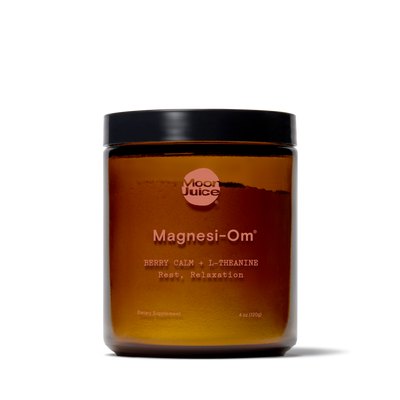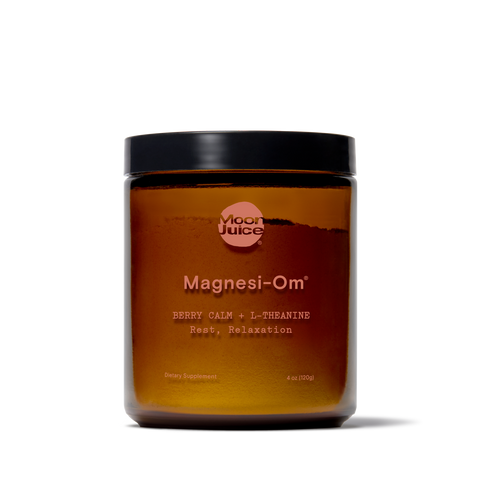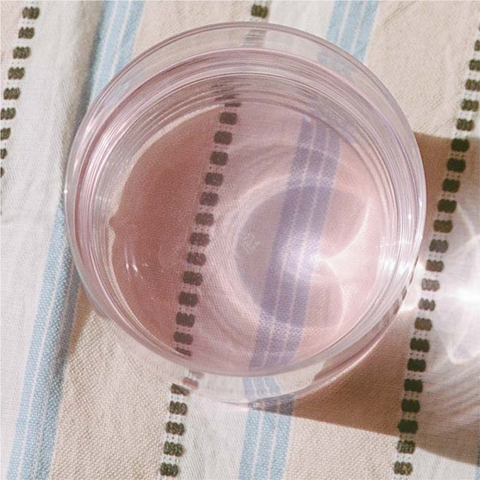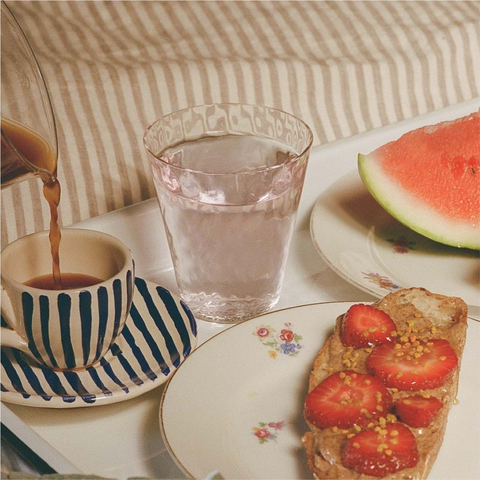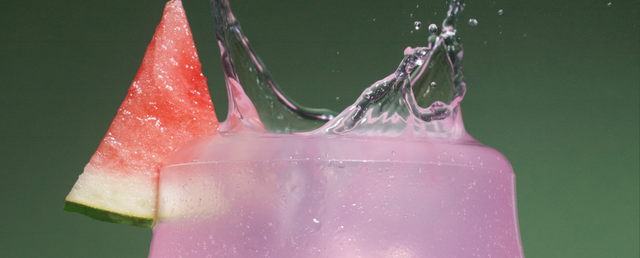Want to improve your sleep? Fortunately, there’s no shortage of healthy hacks to help you do just that. The trick, however, is finding what works for you and what you can seamlessly incorporate into your routine for a good night’s sleep. A great place to begin is on the dietary front. For starters, you’ll want to steer clear of caffeine and alcohol well before bedtime to boost your chances of falling and staying asleep. On the flip side, there are quite a few drinks that help you sleep that are worth incorporating in your nightly wind-down time.
In this article, we’ll recap the best things to drink before bed. Some are fast-acting, while others will take more consistent sipping one night after the next, yet all are expert-vetted to help you catch faster and/or more restful ZZZ’s. Here’s our list of drinks to help sleep.
1. Chamomile Tea
Chamomile tea is one of the best natural sleep aids with a sizable body of evidence backing up its fast-acting, pro-snooze effects. Research shows that chamomile herbal tea can work on the spot, typically kicking in within an hour’s time to help you fall asleep faster and achieve good sleep. According to a 2019 meta-analysis published in the journal Phytotherapy Research, chamomile can also yield significant improvements in sleep quality while reducing symptoms of anxiety.
This tried-and-true drink that makes you sleepy is generally safe for healthy populations who want to fall asleep more quickly, as well as those who struggle to sleep due to chronic stress and rumination. As beneficial as chamomile tea can be, more research is needed to determine its efficacy in people with insomnia or another sleep disorder.
2. Ashwagandha Tea
Though chamomile tea is perhaps the most well-studied herbal tea for sleep, it’s not the only tea that can make you feel sleepy. Ashwagandha tea is another option you may want to consider.
In a 2020 randomized controlled trial published in the journal Sleep Medicine, 144 participants who struggled to achieve restorative sleep took either 120 mg of Ashwagandha extract (which can be used in tea), or a placebo once daily for 6 weeks. The Ashwagandha group experienced a 72 percent increase in self-reported sleep quality compared to 29 percent in the placebo group. In addition, activity monitoring data showed that the Ashwagandha group had significant improvements in:
- Sleep efficiency
- Total sleep time
- Sleep latency (i.e., the time it takes to fall asleep)
Moreover, a 2021 meta-analysis of 5 randomized controlled trials published in the journal PLoS One found that 600 mg of Ashwagandha extract was effective to help adults diagnosed with insomnia when taken consistently over 8 weeks. Bonus: Ashwagandha didn’t only improve their sleep but also reduced their anxiety levels and boosted their alertness upon waking up.
In short, Ashwagandha can be effective for people who struggle to feel well-rested upon waking and even for those who struggle with ongoing insomnia. The benefits of Ashwagandha for stress are another reason to add it to your nightly routine.
In case you can’t find Ashwagandha tea, you can opt for other forms, such as an Ashwagandha powder supplement or capsules.
3. Lavender Tea
Ever reach for lavender-scented products to put your mind and senses at ease when you’re stressed or ready to doze off for bed? It works like a charm if you’re looking to get sound sleep. Per a 2022 review of 20 studies published in the journal Holistic Nursing Practice, 14 of them showed positive effects of lavender essential oil for sleep quality in adults without insomnia or other sleep disorders.
On top of diffusing it, burning a lavender candle, and applying lavender-scented body care products, you can also brew a cup of lavender tea to make you sleepy.
Per a 2020 study in the journal Complementary Therapies in Medicine, lavender has sedative and mood-balancing properties. When consumed via tea, it’s “likely to be effective through both psychological and physiological ways” to promote feelings of calm and alleviate sleep issues. In this specific study, elderly adults who consumed lavender tea at morning and night over the course of 2 weeks reduced scores for depression and anxiety, both of which are associated with poor sleep quality.
In another 2015 study published in the journal Worldviews on Evidence-Based Nursing, 80 Taiwanese postnatal women with poor sleep quality either drank a cup of lavender tea and inhaled its aroma, or received regular postpartum care without the tea, every day for 2 weeks. Those in the lavender tea group reported less fatigue and depression, and even felt greater bonding with their infant compared to mothers in the control group. However, these results dissipated 4 weeks after the test, which suggests that the mental and emotional benefits of lavender tea are relatively fast-acting and manifest with ongoing intake.
4. Tart Cherry Juice
Tart cherry juice — aka sour cherries or Montmorency cherries — is having its heyday as one of the most popular drinks that help you sleep. It’s a key component in the viral Sleepy Girl Mocktail (alongside Magnesium powder, which we’ll dive into in a bit) because of the power of tart cherry juice for sleep. While more studies with large sample sizes are needed, the research to date suggests that there are many benefits of tart cherry juice and it stands up to its lofty reputation.
In a 2012 study published in the European Journal of Nutrition, 20 healthy adults drank either 1 oz of tart cherry juice concentrate or a placebo 30 minutes pre-dinner for a week’s time. Participants in the tart cherry juice cohort benefited from significant boosts in:
- Total sleep time
- Sleep efficiency
- Total time in bed
They also had significant elevations in total Melatonin content. Tart cherries are a food rich in Melatonin — famously known as the sleep hormone — so drinking tart cherry juice can help you get more of this natural sleep aid circulating in your body.
In another small 2018 study published in the American Journal of Therapeutics, 8 adults over 50 years old who were diagnosed with insomnia drank either 1 cup (240 ml) of tart cherry juice or a placebo twice daily over 2 weeks. Again, the results demonstrated the benefits of tart cherry juice for sleep: Participants in the juice group boosted their sleep time by 84 minutes and scored higher marks for sleep efficiency on the Pittsburgh Sleep Quality Index. The researchers also discovered that the juice group showed an increase in tryptophan availability. Tryptophan, which tart cherry juice naturally contains, is an amino acid involved in regulating sleep as it helps to produce Melatonin.
5. Warm Milk
The thought of warm milk for bed might take you on a trip down memory lane, as some parents offer it to their children. But adults shouldn’t (pardon the pun) sleep on this hack, either, as it can help you catch more ZZZ’s and achieve sound sleep.
One reason why warm milk can make you sleepy is that it contains tryptophan — which again is used to produce Melatonin. (Tryptophan can also promote a balanced mood, as it’s also involved in the production of serotonin, an important ‘feel-good’ neurotransmitter.)
Plus, in a 2014 study published in the journal BMC Geriatrics, elderly adults in Japan who struggled to fall asleep easily benefited from drinking more milk (and/or eating more cheese) as well as participating in more leisure-time physical activity.
Tip: Savor some more flavor by incorporating warm milk into Ayurvedic bedtime lattes, such as moon milk with sleep-boosting nutmeg or golden milk with turmeric for better sleep.
6. Magnesium Drink
Taking Magnesium before bed is another helpful hack to promote sleep quality. When consumed in liquid form, your body may even absorb this all-important mineral more readily.
Adequate Magnesium levels are crucial for cellular integrity and function as well as healthy sleep patterns. Maintaining your Magnesium status encourages relaxation and helps to regulate circadian rhythm, aka your sleep-wake cycles. Moreover, if worrying keeps you up at night, you can (literally) rest easier knowing that Magnesium helps you unstress and promotes a better mood by regulating your nervous system.
Not all types of Magnesium are equally effective, however. If you want to drink Magnesium around bedtime to help you sleep, be sure to opt for bioavailable forms that have proven benefits for rest and relaxation. To go the extra mile, seek out a Magnesium powder for sleep that has additional calming, pro-snooze ingredients.

Given its well-rounded formula, Sleepy Magnesi‑Om® (mixed into 12 oz of water) is among the best drinks that help you sleep. It supports slumber without the hangover not only thanks to its 310 mg Magnesium content — including Magnesium Bisglycinate and Gluconate to support the body’s stress response and relaxation* — but also courtesy of:
- Phytomelatonin, a plant-based form of Melatonin extracted from organic Alfalfa and Chlorella, at a 0.3 mg microdose to keep your natural levels of the sleep hormone in the ideal range to support a normal sleep cycle
- L-Theanine, a nootropic amino acid that supports healthy sleep patterns by boosting levels of calming GABA, enhancing alpha brain waves for deeper relaxation, and lowering excitatory chemicals and hormones that can keep your mind abuzz
This all-natural Melatonin and Magnesium powder supplement is a perfect antidote for occasional restless nights, including when your sleep groove is out of whack from travel and shift work. The blackberry-flavored sleep tonic can help reduce the time it takes to fall asleep, promote better sleep quality, and support the body’s stress response for major nighttime relaxation — minus the gnarly next-day side effects that are all too common with many sleep aids.
Sources
- https://pubmed.ncbi.nlm.nih.gov/31006899/
- https://pubmed.ncbi.nlm.nih.gov/32540634/
- https://pubmed.ncbi.nlm.nih.gov/34559859/
- https://pubmed.ncbi.nlm.nih.gov/35708558/
- https://www.sciencedirect.com/science/article/abs/pii/S0965229919316292
- https://pubmed.ncbi.nlm.nih.gov/26523950/
- https://pubmed.ncbi.nlm.nih.gov/22038497/
- https://pubmed.ncbi.nlm.nih.gov/28901958/
- https://www.ncbi.nlm.nih.gov/pmc/articles/PMC4638207/
- https://my.clevelandclinic.org/health/articles/22572-serotonin
- https://pubmed.ncbi.nlm.nih.gov/25407520/
- https://timesofindia.indiatimes.com/life-style/food-news/8-reasons-why-women-must-include-nutmeg-in-bedtime-drink-health-benefits/articleshow/107733029.cms




